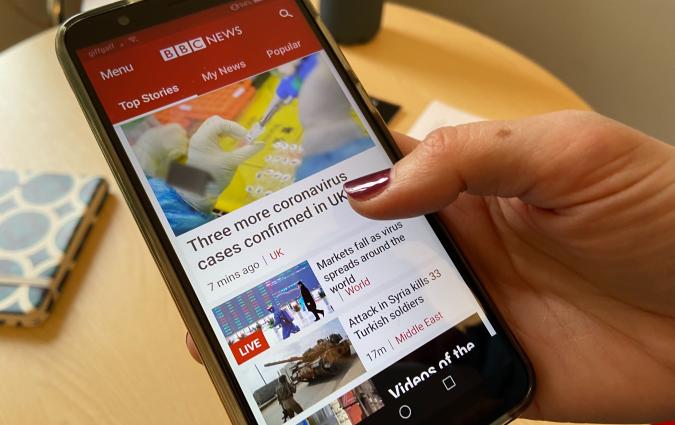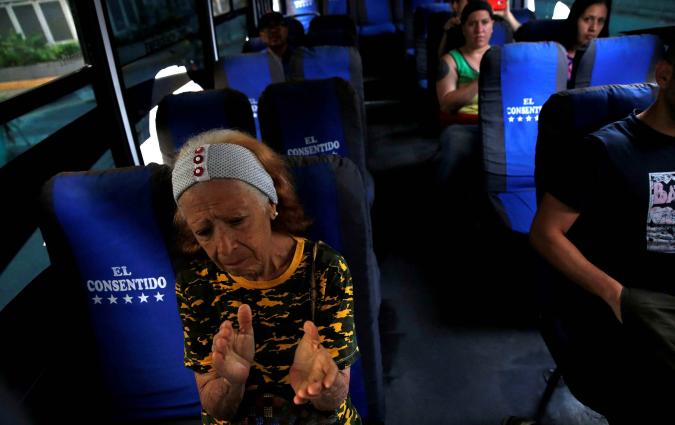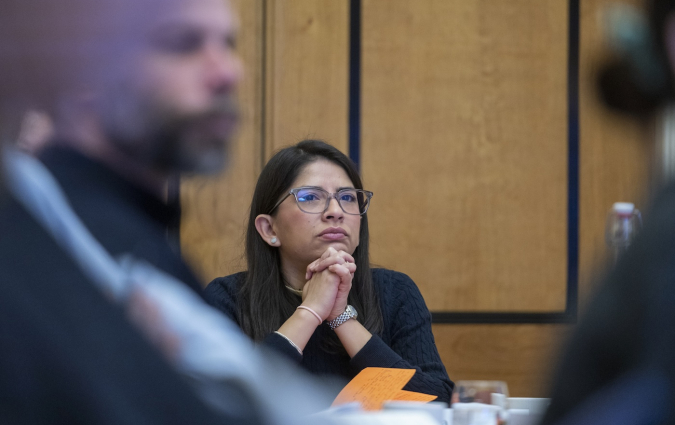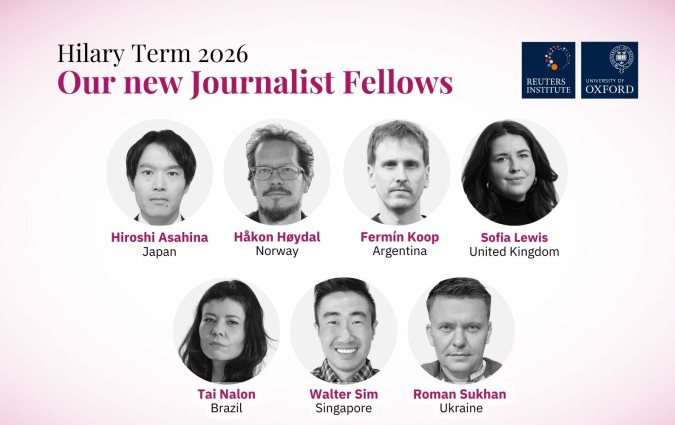As Cambodia approaches a crucial election, journalists suffer shutdowns and abuse
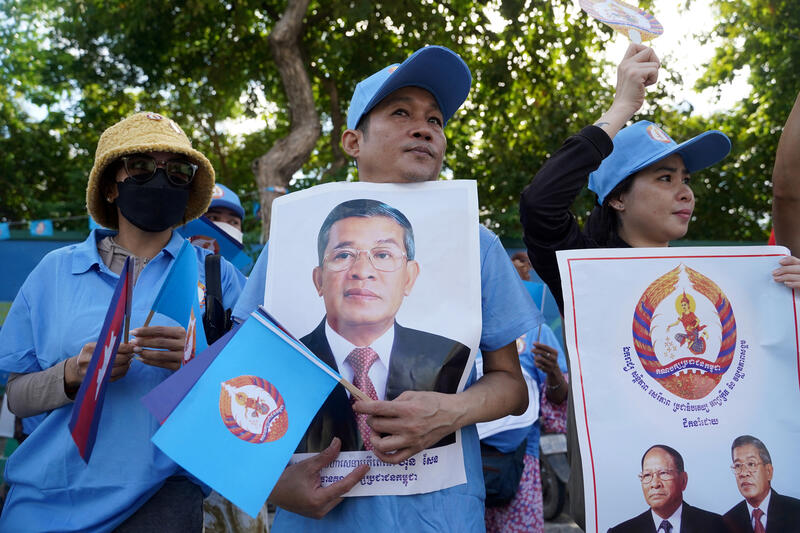
Supporters of Cambodia’s Prime Minister Hun Sen attend an election rally in Phnom Penh on 1 July 2023. REUTERS/Cindy Liu
On 13 February 2023, the Cambodian government revoked the operating licence of Voice of Democracy (VOD), closing one of the last remaining independent news organisations in Cambodia.
VOD, run by the nonprofit Cambodian Center for Independent Media (CCIM) since 2007, was based in Phnom Penh and produced radio broadcasts as well as publishing online in two languages: English and Khmer. The outlet created radio and online news, features and investigations into political corruption, land rights and labour rights. The homepage of its Khmer website was last updated on 12 February and broadcasts were prohibited from the day after.
The week before its licence was revoked, VOD reported on Cambodia giving aid to Turkey after the recent earthquake. Its report quoted a government spokesperson who said that Hun Manet, commander-in-chief of the Royal Cambodian Armed Forces and Cambodian Prime Minister Hun Sen’s son, had allegedly signed off $100,000 in aid, a move that would overstep his authority.
In a statement on Facebook, the Prime Minister reportedly accused the outlet of damaging the “dignity and reputation” of the government. He refused to accept a letter of clarification from VOD and ordered the shutdown.
“VOD is not functioning at all,” Sothoeuth Ith told me in April when I spoke to him. Ith is the media director of CCIM and around 40 of CCIM staff were involved with working on VOD. Some have been brought on to support other projects after the shutdown, but almost half had to leave as a result. Some former VOD staff were offered roles by the government and now work for ministries. Faced with the prospect of unemployment, a few have accepted.
“By reporting the truth to the public, we have been intimidated and our reporters have experienced harassment by the authorities,” Ith says.
We've been here before
VOD is not the only outlet that’s been recently restricted or shut down by the Cambodian government. In March 2022, news outlets Bayong Times, Khmer Cover TV (KCTV) and Cambodia Today had their licences rescinded with no chance of appeal. All three had recently published investigations into corruption amongst political and economic elites.
“The ruling party is concerned about the role of independent media in the country, which are not under government control,” says Nop Vy, executive director of the Cambodian Journalists Alliance (CamboJA), an independent network of professional journalists in Cambodia formed in the wake of government pressure on the news media ahead of the 2018 elections.
The latest moves against independent news organisations come ahead of general elections to be held in Cambodia on 23 July 2023. Seventy-year-old Prime Minister Hun Sen, described as “an authoritarian ruler in a nominally democratic state”, has held power for 38 years and is widely expected to be replaced by his son. In May, the country’s main opposition party, the Candlelight Party, was barred from running in the election with authorities claiming it did not have “the right paperwork”.
“The ruling party is trying to transition power to the new generation. So they want to make sure everything is under control – including the media,” says Ith. “That’s why independent media has been silenced.”
Before these latest actions, an increasing number of journalists have been co-opted, either by offering them jobs within government or as supporters. “They [the government] try to set a new narrative for Cambodian society and what independent media should look like,” says Ith. By setting this narrative, journalists can be labelled as critics or opposition if they do not follow the government’s line.
History repeats itself
The recent media shutdowns echo steps taken by the Cambodian government following previous elections in 2013 and 2018.
The re-election of Hun Sen in 2013 was disputed, leading to protests and calls for an investigation into voting irregularities. There was a lot of media coverage of the demonstrations, explains Daniel Bastard, Asia-Pacific Director of Reporters Without Borders (RSF): “[Prime Minister Hun Sen] didn’t want this to happen again. He had the leader of the opposition put in jail [in 2017]. Now you can’t consider Cambodia as a working democracy.”
In 2017, the English-language newspaper Cambodia Daily was forced to close by authorities on the basis of an alleged unpaid tax bill of a reported $6.3 million. Two reporters were also investigated on incitement charges. Some radio stations, including Voice of America, were forbidden to report or forced to be online-only.
“Now it’s happening again ahead of the [2023] elections,” says RSF’s Bastard. “VOD was the last remaining mainstream independent media in Cambodia. Now you just have a few news sites and Facebook pages.”
Following its closure, some Cambodia Daily staff moved to the Phnom Penh Post, but this title had already been sold to Malaysians with close ties to Cambodia’s Prime Minister. “They [the journalists] knew it wasn’t going to be free and independent anymore,” says a media expert inside Cambodia. Those who moved to the Khmer Times found they couldn’t produce sensitive or investigative content because of its ownership “so they had to quit again”.
As it happens in other countries, controlling who owns the media is another way to prevent journalists from doing their job. “Cambodia is following the Chinese model in some ways in terms of press freedom,” says RSF’s Bastard. “Even if the mainstream media isn’t state-owned, it’s owned by the family of the Prime Minister.”
What repression looks like
The government’s actions and allegations against the media in 2017 led to several forms of self-censorship. The Cambodian arm of Radio Free Asia (RFA), a private nonprofit corporation funded by a grant from the US government but with editorial independence, was known for reporting sensitive and high-level, political stories. It was not shut down by the government, but decided to close its Phnom Penh bureau in 2017 following the “relentless crackdown” on other media outlets in the country, in particular Cambodia Daily and outlets carrying RFA broadcasts.
RFA says that while the 2017 closure of its Phnom Penh bureau has obviously impeded its newsgathering inside Cambodia, RFA Khmer still makes use of sources both within and outside Cambodia to cover events as they happen and broadcasts twice-daily news shows by shortwave radio into the country, as well as publishing online and via social media for Cambodian audiences.
Government restrictions and intimidation have taken many different forms. In the 48 hours before the 2018 election, the government ordered local internet service providers to block news websites, including VOD and the Phnom Penh Post.
The Women’s Media Centre of Cambodia, a nonprofit that produces news and educational content via radio, online and video, has acted as a broadcast partner in the country for Radio Free Asia and other radio stations. It had a very popular broadcast frequency, known even in rural areas, but in 2018 the government forced the outlet to move to a lower, less popular frequency that made it harder to reach audiences.
Cambodia ranks 147th of 180 countries in RSF’s 2023 Press Freedom Index, dropping five places from 2022. Its entry cites the slew of media closures instigated by the state in the past six years and the state’s relationships with existing news outlets. “The wave of closures and taming of newsrooms in 2017 and 2018 amounted to a clean sweep that deprived Cambodians of any access to information other than that disseminated by the media companies linked to Hun Sen,” says RSF’s report.
CCIM’s Ith says this time feels different: “In the past, maybe they just crack down on the media and, when the political situation gets better, they allow you to continue your work. But now it seems like they know what they want to achieve.”
Working as a journalist in Cambodia
The increasingly restrictive environment makes it risky for journalists and media outlets to report on sensitive issues. Reporters at VOD have faced intimidation, harassment and violence, says CCIM’s Ith, recalling an occasion when a VOD reporter was slapped by a member of the Prime Minister’s bodyguard unit.
“There’s a large amount of self-censorship which is difficult to measure,” says RSF’s Bastard, who points out that this may allow journalists to protect themselves from arrest or harassment, but ultimately damages the free flow of information in the country.
Reporters have previously been stopped from taking photos and videos by authorities. Covering a protest at an event marking 29 years of the Paris Peace Agreements in 2020, for example, VOD and Khmer Times reporters were reportedly threatened and intimidated to prevent them from recording the scene.
The loss of so many outlets and the rise in restrictions in 2017 counterintuitively swelled the popularity of the remaining “independent” outlets. Though VOD had been operating for more than 20 years in Cambodia, it wasn’t previously as popular as other outlets, says the media expert I spoke to: “Its content and reporting capacity was more limited. But after the other outlets were gone, they were the only ‘independent’ outlet in place and produced more investigative content.”
What this means for audiences
Civil society and policy-makers have lost “a lot of reliable information” in the past six years with the closure of so many Cambodian news outlets.
To counter this, CamboJA launched CamboJA News, its English-language news site, at the end of 2019. In addition to reporting on politics and social issues with a team of around five reporters, it covers press freedom and records attacks on the press in the country.
As an association, CamboJA offers training and capacity building support to journalists in the country, including support for some freelancers who previously worked at shuttered newsrooms. CamboJA’s Vy says training journalists in a code of ethics can offer them – and audiences – another level of protection.
But CamboJA News has faced challenges too: it was contacted by the Ministry of Information in relation to an article it published in March about the revocation of three digital media licences. The report quoted a spokesperson from the ministry. A day after its publication, the spokesperson accused CamboJA News of misinformation because it had not included his entire statement verbatim and threatened legal action.
With an estimated 11.6 million Facebook users in Cambodia in 2022 – the country’s population is approximately 16.9 million – pro-government and still operational news outlets covering Cambodia, such as RFA, use the platform to reach audiences. However, only 30% of Cambodians have basic digital literacy, according to government figures.
“There’s a huge loophole for the people to access reliable sources and there’s a lot of poisonous news online in Cambodia,” says the media expert I spoke to.
VOD had produced videos and podcasts that could reach social and online audiences. But in the run-up to the election, the main sources of news online are pro-government sources. They produce stories responding to social trends and divert audiences’ attention from more pressing issues.
The government cites the widespread use of Facebook in the country as evidence of great freedom of expression in Cambodia. Yet Prime Minister Hun Sen has pursued legal action against journalists and members of the public alike for Facebook posts deemed to be insulting.
A depleted industry
The lack of trustworthy information will be exacerbated further by the job losses caused by the effective shutdown of VOD and other independent news organisations.
When VOD’s licence was revoked, its journalists were told they couldn’t keep on working unless they resigned from the broadcaster. At least 26 of those media workers, including non-reporters working as VOD producers, decided to take jobs within the government. “Most of them were scared for their own security,” says the media expert I spoke to.
It is uncertain whether CCIM will be able to relaunch VOD or set-up an alternative after the election. “They are very afraid of what the government can do,” says RSF’s Bastard. “There’s really a war between the government and what CCIM represents.”
When asked whether it was likely VOD would be able to resume its work in the future, CCIM’s Ith said it is still looking at how “we can continue to operate under a new format”. Other interviewees said the expected transfer of power to Hun Sen's son makes the future for Cambodia’s media harder to predict.
“At the beginning, I was optimistic with VOD, but we’ve lost hope,” says CamboJA’s Vy. “We’re not sure yet if we can recall the licence bans, but I think the people at VOD are thinking about alternatives so they can continue to promote access to information in the country.”
Against a backdrop of media closures and restrictions, CCIM’s programmes to improve media literacy and its training of citizen journalists in all provinces feel even more crucial. International organisations, including the UN, have condemned the closure of VOD. “We strongly urge authorities to reverse the decision,” a statement from a group of UN experts reads.
Ith says the international community must continue paying attention and reporting on Cambodia. “Don’t let it disappear from the international stage,” he says. “It’s still relevant; it’s still important. We have the Paris Peace Agreement that makes Cambodia a democratic country and in principle we adhere to this, but freedom of the press is one of the key elements.”
This article was updated on 10 July to clarify points about RFA's ownership, editorial independence and ongoing journalism within the country.
In every email we send you'll find original reporting, evidence-based insights, online seminars and readings curated from 100s of sources - all in 5 minutes.
- Twice a week
- More than 20,000 people receive it
- Unsubscribe any time


